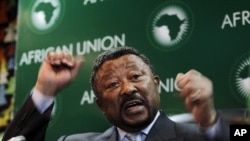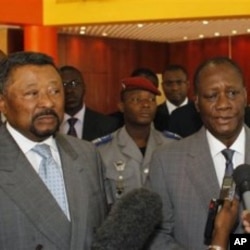The head of the African Union Commission has wrapped up talks in Ivory Coast by inviting both of the country's rival presidents to a meeting in Ethiopia to resolve their political crisis.
African Union Commission chief Jean Ping left Ivory Coast's commercial capital after separate talks with incumbent president Laurent Gbagbo and the United Nations-certified winner of November's presidential vote, former prime minister Alassane Ouattara.
Ping went to Abidjan with a message from the presidents of Burkina Faso, Chad, Mauritania, South Africa, and Tanzania. Those five heads of state make up an African Union panel given the task of solving Ivory Coast's political crisis by the end of March.
During his time in Abidjan, Ping did not publicly disclose the content of that message, but he did invite both Gbagbo and Ouattara to African Union-sponsored talks in Addis Ababa Thursday.
Ouattara says he plans to attend that event. If he does, it will be the first time he has left the besieged Abidjan resort-hotel where he has been living since election results were announced in early December. There has been no response so far from Gbagbo or from the head of Ivory Coast's constitutional council, Paul Yao N'Dre, who was also invited.
Gbagbo's claim to the presidency is based on N'Dre's council annulling as fraudulent nearly ten percent of all ballots cast. Ivory Coast's electoral commission and the United Nations have certified results that show Mr. Ouattara won that vote.
The standoff between their rival governments in Abidjan has grown increasing violent over the past week. On Thursday, Gbagbo security forces shot dead at least seven women during a protest calling for Mr. Gbagbo to step down.
Gbagbo militants have set up barricades in pro-Ouattara neighborhoods. And Ouattara supporters say Gbagbo's youth wing is ransacking the homes of members of Ouattara's cabinet.
There was also fighting in western provinces, near the border with Liberia, were Gbagbo government troops and rebels who back Ouattara have broken a six-year-old ceasefire.
The United Nations says at 365 people have been killed in violence since November's vote.
African Union efforts to end the conflict follow failures by the West African regional alliance and the former presidents of Nigeria and South Africa.





